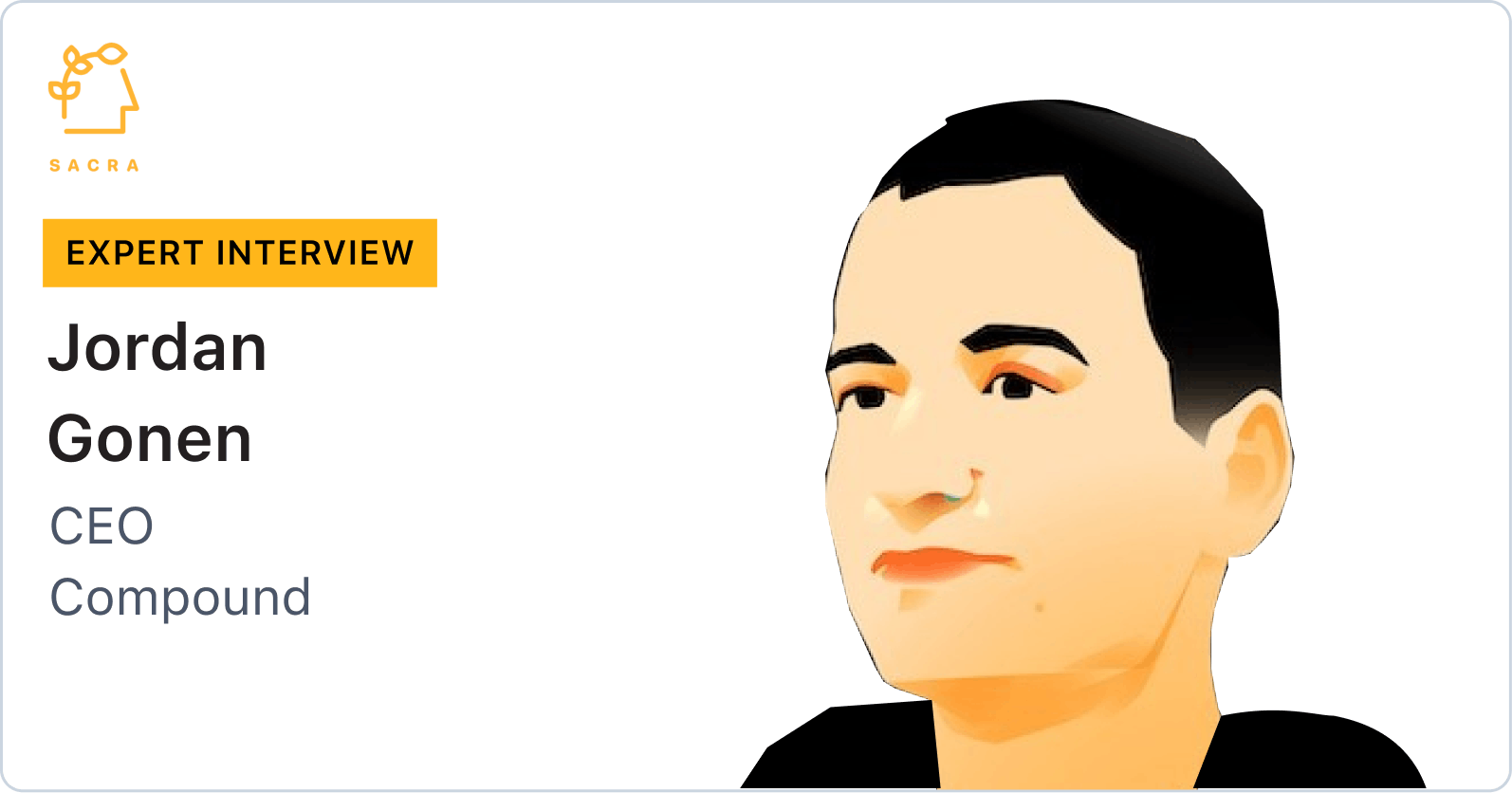Jordan Gonen, CEO of Compound, on software-enabled wealth management
 Walter Chen
Walter Chen

Background
Jordan Gonen is the CEO of wealth management platform Compound. We asked Jordan about the evolution of personal finance, the digitization of private assets, and all things wealth management—from tax optimizing your angel investments and startup options to estate planning, donor-advised funds, and startup employee horror stories.
Questions
- What's one piece of advice that you tell folks in tech companies that usually is a lightbulb moment for them / something they were never aware of?
- What are some of the strategies compound is using to help start up founders and employees manage their money in a risk adverse way? Does the platform provide suggestions for rebalancing, etc?
- How do you facilitate private market investments? Any examples of past transactions?
- I'm an employee at an early stage startup and most of my networth is in stock options. How can Compound help me with my financial situation?
- Do you consider yourself to be software enabled services? Aside from the interface, how do you think about what's software and the leverage you get from software?
- What real estate opportunities do you typically offer and how do you source them?
- I'd love to hear your thoughts and experience seeing tech employees go through the IPO process. Things I should think about, mistakes to avoid—would be super helpful.
- How much do you think pre—seed VC—funded founders should pay themselves in a pre—product market fit stage?
- What recommendations do you have for employees of late stage startups that have a large percentage of their paper net worth locked up in the company's equity? Should their public market assets be risk—adjusted accordingly? Or is it better to pretend the paper money doesn't exist when determining their asset allocation for their other assets?
- What are the 3 biggest missed opportunities for folks who are just on the other side of a company exit/liquidity event?
- The product is $2k/mo. How do you acquire customers and get folks to make a pretty big commitment, even if they're making $300k+ TC?
- Can you talk a little about some of the tactical things you are seeing in wealth management that are important in the current economic climate?
- How do you think about prenuptial agreements? Are there other, possibly less controversial options to avoid financial ruin in the event of a divorce?
- If a client wants to sit on cash instead of stocks or other assets in this climate, what do you recommend in terms of solutions for cash management?
- How did you come up with the idea for Compound? This doesn't seem like a typical "scratching your own itch" startup.
- How do you think about risk management and avoiding scenarios where Compound's brand might be affected by perceived recommendations to invest in, say, crypto or DeFi or whatever the latest financial trend is—and then that category massively declining?
- What do you think about margin loans and in what scenario should folks consider using them?
- As an angel investor, how do you think about check sizes based on round (seed, series A, etc)?
- How do you deal with the (legal) risk of your own advice as a company? Half the time, legal and tax advisors say what they're (italic intended) giving shouldn't be taken as legal/tax advice. Do you have a risk based approach to it?
Interview
What's one piece of advice that you tell folks in tech companies that usually is a lightbulb moment for them / something they were never aware of?
I think a lot of smart, ambitious people procrastinate thinking about their startup equity—because it's this thing that's not quite cash and not quite a lottery ticket and doesn't fit into their rational view of the world—but what they don't realize is that not doing anything is still a choice and has consequences.
This materializes in many ways—one common not so fun scenario is when all of your equity expires and goes to zero because of something called the post-termination exercise window. If you leave your company, and you don't exercise your equity (and pay the exercise and tax costs) within the post termination exercise window (oftentimes something like 90 days), all your equity goes to zero.
What are some of the strategies compound is using to help start up founders and employees manage their money in a risk adverse way? Does the platform provide suggestions for rebalancing, etc?
Risk is a tricky thing to quantify.
I know that when I hear people talk about risk tolerance, the voice in my head goes something like, "Um, I'm not really sure if I'm a 4 or 7 on the risk scale. These numbers seem arbitrary to me and rather abstract."
This led us to ask the question, in thinking about asset allocation planning in general, about how we can make it more concrete so you can better understand the implications of the decisions you're making.
One way we do this is by making your implicit assumptions explicit. We work with you to help you understand what you may believe about the future and how confident you are in your beliefs (and where your confidence really stems from). Writing out your big ticket investment decisions (and walking through tradeoffs) can really help you minimize your regret over time.
Beyond this, though, we have a menu of resources that may be useful (from collared options to diversifying into alts to making sure you have the appropriate tax-advantaged entities set up). The truth is there's no one way to do asset allocation but we work with you in a personalized way to apply the menu of strategies to your personal situation.
To answer more directly, we do a ton of post-liquidity diversification strategies where we show you the implications of holding a concentrated positions and build tax-aware scenario plans to help you model the implications of various decisions.
How do you facilitate private market investments? Any examples of past transactions?
At this point, we've got a community of tech founders, employees, and investors that represent both sides of the marketplace (i.e. we have people who want to sell their equity and we have people who want to buy). We also work with a number of funds/banks/lenders/platforms to fill in the demand side of the equation. As a client, you work with your Compound advisor to figure out what (if any) liquidity strategy may make sense in the context of your broader financial picture and then our team has built tooling/software/processes to make the experience as efficient as possible.
I'm an employee at an early stage startup and most of my networth is in stock options. How can Compound help me with my financial situation?
We can help in a few ways. We tend to think about people as investors of their time and money and they want a return. That return can be money, but can also be things like fun, learning, impact, prestige, etc. Our job at Compound is to help you build a personal investment strategy so that you can fulfill your desired return. We can't promise returns, but we can help you see the different scenarios.
Compound begins by cataloging a complete inventory of a client’s assets and liabilities, including startup equity, fund investments, angel investments, crypto, real estate, bank accounts, retirement accounts—everything.
They’re desperate for a solution that gives them a complete picture, particularly with regards to their stock options. They immediately want help with their most important decisions, like "Should I exercise my NSOs?”, and feel equipped when armed with advice and complete data.
Client profiles are kept continuously updated through custom integrations with products like Shareworks and Carta, alerting clients of important events such as 409A increases and QSBS timelines. The Document Vault serves as the client’s information hub—the single source of truth for all financial information and legal documents. Everything from 83(b) certificates to K—1s.
Clients walk away from their onboarding having learnt something about their financial situation and they build confidence that Compound is the right partner to entrust with their most important financial decisions.
Finally, each client has an advisor as their point of contact. While the typical client-advisor CFP relationship is centered around retirement, Compound’s clients are not. Its financial managers are experienced advisors who understand the emotional and technical nuances of a career in startups. They provide tactical recommendations, facilitate product implementation, and are providing constant feedback to the engineering and product teams.
Do you consider yourself to be software enabled services? Aside from the interface, how do you think about what's software and the leverage you get from software?
I would say we're in the solutions business. In other words, we build lots of software and services but the whole point is to build the best possible client experience. Candidly, a lot of the time we're building the experience we wish we had ourselves. That being said, it turns out that traditional firms spend a ton of time on process that would be both more efficient and better for clients if powered by a software ecosystem.
What real estate opportunities do you typically offer and how do you source them?
We do offer real estate opportunities as part of our broader asset allocation planning (in other words, we help clients figure out their holistic pie chart of where to allocate their capital and then fill in different sections with for example real estate if and when it makes sense). Our investment team works diligently to select appropriate deals for our clients to choose from in partnership with their advisor.
I'd love to hear your thoughts and experience seeing tech employees go through the IPO process. Things I should think about, mistakes to avoid—would be super helpful.
First of all, congrats—you did a lot of the hard part, which is helping a company actually go public. I highly suggest you speak with a professional, and we specialize in this at Compound.
I'd do a version of the following.
Determine how much money you need to maintain your current lifestyle. The simple approach is to login to your bank, click on your checking account, and look at how much money you have.
However, I’d suggest taking a more holistic look at your finances by looking at your complete balance sheet. Add all of your cash, public market investments, private market investments, and any other assets. Then subtract out liabilities such as credit card debt, student loans, or a mortgage. The result is your net worth.
Then, figure out how much money you can invest, and set some cash aside for expenses that are due in the short-term in cash. This can include an emergency fund (generally 3-6 months of living expenses), taxes for next year, and general spending (house payment, wedding, etc.).
The amount of money you have remaining is the amount you can invest.(Of course, there are many people who don’t have enough money to set aside an emergency fund, let alone excess funds to invest. This thinking assumes that you’ve been able to save some of your salary for a while such that you have liquidity to invest.)
Now, you probably don’t want to invest all of your money into risky, illiquid startups so that money you have—your investment budget—should be allocated in risk-stratified ways according to your risk preferences, financial goals, and time horizons.
To help determine your allocations, figure out your financial goals. In finance terms, you’d call these “future liabilities” since they’re things you’ll want to pay for in the future.
What purchases do you want to make? How much wealth do you need to maintain the lifestyle you want? What is your risk tolerance?
Holding a concentrated position—like your company stock—has pros and cons, largely dependent upon the stock's performance. You'll want to consider things like tax implications—like if you hold for more than 1 year since acquiring the stock, you can get long term capital gains—in your sell-off and reinvestment strategy.
Answer these questions—alongside a professional—and you'll begin to arrive at a shape for your overall asset allocation.
How much do you think pre—seed VC—funded founders should pay themselves in a pre—product market fit stage?
I think about startups as a mountain of risk. Your job as a founder is to de-risk the business over time. You can do this in lots of ways—building product, earning revenue, getting customers, raising money, hiring people—but I'd answer this question in the context of, "What's the appropriate amount to pay yourself such that you're able to de-risk the business to get to the next level?"
There's no universal right answer. There are probably wrong ones though. For example, paying yourself zero dollars so you have to live on the street probably does not increase your company's odds of success. Paying yourself millions of dollars a year so you can hire zero other people probably also doesn't. I see a lot of founders—depending on runway—pay themselves between $80K and $150K, but again, it depends on runway and stage of the business.
What recommendations do you have for employees of late stage startups that have a large percentage of their paper net worth locked up in the company's equity? Should their public market assets be risk—adjusted accordingly? Or is it better to pretend the paper money doesn't exist when determining their asset allocation for their other assets?
The unsatisfactory (though probably appropriate) answer is that it depends.
It depends on how close the company is to going public, how much money you have liquid (or close to liquid today), and what you want to do with your money. I know that's not particularly useful—so what I would do is instead build yourself a cashflow plan—we can help you do this at Compound.
It's not rocket science, candidly, but it's basically helping you answer the question: "How much money do I have today, where is it, and will I have enough money in the future to afford my lifestyle given the following assumptions?"
The work is in playing with the assumptions. "Will my company go public this year? Next year? How much will I make? What about taxes? What if I get married and move states?"
I'd then build out scenarios so you understand the pros and cons of each strategy, and then write a memo to yourself where you understand the risk (make it explicit!) associated with each strategy (know what you are betting on). I think the above exercise would be productive. Above all else though, make your company really valuable.
What are the 3 biggest missed opportunities for folks who are just on the other side of a company exit/liquidity event?
Hard to rank three so just consider these pieces of a toolkit. Actually applying the tools depends upon your personal situation/preferences/goals/etc.
1. Donor advised funds (DAFs) are investment accounts, created for the sole purpose of supporting charitable organizations. A donor-advised fund allows you to give appreciated stock or assets like crypto to charity and receive an immediate tax deduction in a high-income year, with the flexibility to determine which charities you want to give to at a later time. Donor-advised funds can also be an effective way to bring your family together and talk to your kids about their giving strategies.
2. Estate planning—if you are in the realm of dealing with the lifetime gift exemption (currently ~$12m if you are in the US), exploring irrevocable planning may make sense.
3. Diversification—diversifying into other asset classes is a great way to mitigate concentrated risk. A lot of people procrastinate this and then never sell if the concentrated position drops.
The product is $2k/mo. How do you acquire customers and get folks to make a pretty big commitment, even if they're making $300k+ TC?
We try to align what we charge with the value we're generating. Our price is actually a lot less expensive than what you're quoting here (starting on the order of single digit thousands of dollars a year). Traditional firms often charge on the order of 1%+ in asset under management fees, and don't include helpful things that we do, like tax advice, tax filing, net worth tracking, and more.
Can you talk a little about some of the tactical things you are seeing in wealth management that are important in the current economic climate?
The world is certainly changing as it always will, though perhaps now it feels more volatile than it has in a while.
In general, our view is that the world is going to continue to get more complicated and you're going to need more and more help navigating that world so you don't have to become a professional finance person to live your life.
With that being said, we're seeing people—depending on where they are on their wealth journey—diversifying away from concentrated positions, making what we may call realistic projections with their private company stock, and looking for yield in creative ways, like buying I bonds.
How do you think about prenuptial agreements? Are there other, possibly less controversial options to avoid financial ruin in the event of a divorce?
There are different types of estate plans. When you die, the default outcome is that you and your loved ones pay for the privilege for all your finances to become public record for anyone to view. You can easily avoid this by simply using a trust.
Otherwise, your estate is submitted to a process called probate, where the state judicial system will publicly gather your holdings, pay your creditors, and distribute the remaining assets (per your will, if you left one; to family members, per the state’s default rules if you did not).
This process costs roughly 2—7% of your total probatable assets and delays the inheritance process by 12-18 months.
Trusts allow you to bypass the entire probate process and have control over the distribution of your assets after death. An estate plan is the set of instructions on what to do about you after you’re dead. Since you’re dead, you can’t handle your own affairs yourself anymore, so the estate plan explains what you want to happen.
A well drafted estate plan also includes instructions on what you want in the event you are still alive but unable to speak for yourself. Dying without leaving any valid instructions is known as dying intestate. If you die intestate, all your money, things, pets, everything that doesn’t have pre-set instructions, gets kicked into the government’s default program for people who didn’t leave instructions. It’s not that bad as far as default options go, (it mostly directs things under next-of-kin principles), but it is painfully slow and every state has different rules and it almost certainly will have some twist making it unlikely that the outcome is what you would have chosen.
Unless you are looking to make things difficult for your loved ones, you’ll want to avoid dying intestate—though if causing chaos from beyond the grave is a goal, it could be worth exploring.
When you set up either of these, you'll often handle tackling or at least start the conversation around prenuptial agreements (but they won't be a replacement for them)
If a client wants to sit on cash instead of stocks or other assets in this climate, what do you recommend in terms of solutions for cash management?
I'd do this sort of planning in the context of your broader financial goals. That being said, some tools to look at include I bonds and other types of T-Bills.
How did you come up with the idea for Compound? This doesn't seem like a typical "scratching your own itch" startup.
My background is in software engineering. Candidly, I kinda hate finance (all the numbers and acronyms frustrate me). We started Compound because we saw way too many of our friends get screwed over by startup equity and realized that there was a long-term business to be built helping people (like me) not have to worry so much about their finances.
How do you think about risk management and avoiding scenarios where Compound's brand might be affected by perceived recommendations to invest in, say, crypto or DeFi or whatever the latest financial trend is—and then that category massively declining?
I'll say it clearly—we at Compound are not magicians with crystal balls capable of seeing the future.
I think some financial platforms (old and new) position themselves as the "oracles above" and it creates a whole mess of problems like you are describing.
I view our job primarily instead to be the place that helps you understand the implications of decisions you may make. as granularly as you'd like. We help you tackle these questions both technically and psychologically and then help you understand how many other people in your boat have made this decision.
Throughout the process, though, we like to help you see and be comfortable with both the upside and downside scenarios. We do also help you get access to things (and we focus especially on things that may be less correlated with your concentrated risk). We'll never pressure anyone to invest in any particular vehicle. We view this as a really long term relationship (decades or longer hopefully) and are committed to supporting our clients' growth.
What do you think about margin loans and in what scenario should folks consider using them?
The question to start with: "What do you wish to do with your money (today and in the future)?"
Once you've thought about this, you can then try to answer the question of how to afford buying and/or investing in said things.
This then becomes a math equation—and effectively you're looking at the cost of the capital you have available to you (which may be a margin loan, which can be a useful tool in some circumstances) and comparing that with all the liquidity you have at your disposal. The cost of using a margin loan may depend upon your underlying assets—but beware of taking on too much leverage (too much debt) without confidently being able to pay it back in a downside scenario.
As an angel investor, how do you think about check sizes based on round (seed, series A, etc)?
I think, in general, try to decide around check size as part of your overall investment strategy. There are plenty of successful angels who run very diversified portfolios and there are others who are very concentrated. I'd think about what advantages—information, or others—you may have as you think about investing in a risky asset class like startups.
How do you deal with the (legal) risk of your own advice as a company? Half the time, legal and tax advisors say what they're (italic intended) giving shouldn't be taken as legal/tax advice. Do you have a risk based approach to it?
We care deeply about making sure we're building our business in a compliant and legal fashion. There's no quantitative framework but we always try to use appropriate disclosure (for instance, nothing in this chat is directive financial or tax or legal advice).
Disclaimers
This transcript is for information purposes only and does not constitute advice of any type or trade recommendation and should not form the basis of any investment decision. Sacra accepts no liability for the transcript or for any errors, omissions or inaccuracies in respect of it. The views of the experts expressed in the transcript are those of the experts and they are not endorsed by, nor do they represent the opinion of Sacra. Sacra reserves all copyright, intellectual property rights in the transcript. Any modification, copying, displaying, distributing, transmitting, publishing, licensing, creating derivative works from, or selling any transcript is strictly prohibited.






